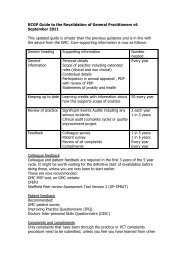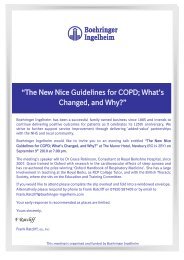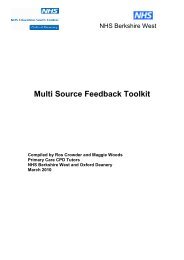Oxfordshire Primary Care Antimicrobial Prescribing Guidelines up ...
Oxfordshire Primary Care Antimicrobial Prescribing Guidelines up ...
Oxfordshire Primary Care Antimicrobial Prescribing Guidelines up ...
Create successful ePaper yourself
Turn your PDF publications into a flip-book with our unique Google optimized e-Paper software.
OXFORDSHIRE PRESCRIBING GUIDELINES FOR THE USE OF ANTIMICROBIAL AGENTS<br />
FOR PRIMARY CARE 2008<br />
2<br />
Aims<br />
• To provide a simple, best guess approach to the treatment of common infections<br />
• To promote the safe, effective and economic use of antibiotics<br />
• To minimise the emergence of bacterial resistance in the community<br />
• To reduce the risk of infection from MRSA, Clostridium difficile and other resistant bacteria<br />
• To maintain the effectiveness of antimicrobial agents in the treatment of infections by reducing the risk of<br />
bacteria developing antimicrobial resistance.<br />
Principles of Treatment<br />
1. This guidance is based on the best available evidence but its application must be modified by professional<br />
judgement.<br />
2. A dose and duration of treatment is suggested. In severe or recurrent cases consider a larger dose or longer<br />
course<br />
3. Treatment of most infections should not exceed 7 days.<br />
4. Prescribe an antibiotic only when there is likely to be a clear clinical benefit.<br />
5. Do not prescribe an antibiotic for viral sore throat, simple coughs and colds.<br />
6. Limit prescribing over the telephone to exceptional cases.<br />
7. Use simple generic antibiotics first whenever possible. Avoid broad spectrum antibiotics (e.g. coamoxiclav,<br />
quinolone’s and cephalosporin’s) when standard and less expensive antibiotics<br />
remain effective, as they increase risk of Clostridium difficile, MRSA and resistant UTI’s.<br />
8. Avoid widespread use of topical antibiotics (especially those agents also available as systemic<br />
preparations).<br />
9. In pregnancy AVOID tetracyclines, aminoglycoside’s, quinolone’s, and high dose metronidazole. Short-term<br />
use of trimethoprim (theoretical risk in first trimester in patients with poor diet, as folate antagonist) or<br />
nitrofurantoin (at term, theoretical risk of neonatal haemolysis) is unlikely to cause problems to the foetus.<br />
10. Clarithromycin is an acceptable alternative in those who are unable to tolerate erythromycin because of side<br />
effects.<br />
*Useful websites include:<br />
http://www.hpa.org.uk/infections/topics_az/primary_care_guidance/menu.htm<br />
http://www.brit-thoracic.org.uk<br />
http://cks.library.nhs.uk/clinical_knowledge<br />
Grading of guidance recommendations<br />
The strength of each recommendation is qualified by a letter in parenthesis.<br />
Study design<br />
Recommendation<br />
Grade<br />
Good recent systematic review of studies A+<br />
One or more rigorous studies, not combined A-<br />
One or more prospective studies B+<br />
One or more retrospective studies B-<br />
Formal combination of expert opinion<br />
C<br />
Informal opinion, other information<br />
D<br />
Please refer to BNF for further information.<br />
APCO Approved January 2008<br />
APCO Approved Amendments; November 2008, March 2009, September 2010<br />
Review Date January 2010<br />
2










